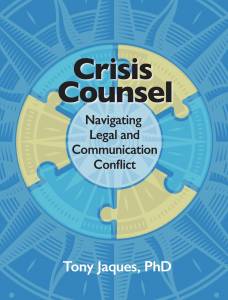Will a post-COVID-19 supply-chain crisis ruin your Christmas?
BY TONY JAQUES PHD, DIRECTOR OF ISSUE OUTCOMES PTY LTD, FOR PEOPLE WHO WORK IN ISSUE AND CRISIS MANAGEMENT, AUTHOR OF CRISIS COUNSEL: NAVIGATING LEGAL AND COMMUNICATION CONFLICT.
Just as the world seems to be slowly recovering from the worst of COVID-19 – despite new variants – business continuity and supply-chain are emerging as major crisis risks.
It should be well-recognised that business continuity is not the same as crisis management. That having a great business continuity plan is no substitute for a comprehensive crisis management process.
Yet the post-pandemic supply-chain debacle is testing that distinction as shipping problems and staff shortages pose a genuine crisis risk for organisations of all sizes. Indeed, The Guardian recently described the supply-chain crisis as a “perfect storm which could blow the world economy off course.” Australian e-commerce trader Peter Cole put it even more bluntly when he told Wired: “The whole system is totally f****d.”
Experts and arm-chair commentators are still arguing about the cause. For example, the BBC says: “Disruption caused by the COVID pandemic is mostly to blame,” and a very detailed analysis on the New York Times concluded: “In one way or another, much of the crisis can be traced to the outbreak of COVID-19.”
However, Harry Boardman in Forbes claims: “COVID-19, itself, has played a much smaller role in giving rise to these developments than most observers suggest or even assert.” Others say the real cause is fundamental logistics weaknesses which existed long before COVID.
For organisations struggling to recover from the immediate effects of supply-chain failures and mandated shutdowns, the underlying cause is somewhat moot. Despite the sugar hit from Black Friday and end-of-year sales, some businesses still face an existential crisis, with falling revenue, dramatically rising transport costs, seemingly endless delivery delays, increasing high-street rents and shortages of experienced staff.
Although politicians may prematurely crow about claimed “green shoots of recovery,” and voters may bleat about misspending of taxpayer dollars on pandemic support, the reality is that tens of thousands of lost jobs will never be regained, many small and medium sized businesses and consultancies will close, and a generation of otherwise productive workers will “choose to retire early.”
Among all this gloom, one ray of hope is that consumers don’t appear to blame the shopping chaos on brands. A new survey of US adults shows they mainly blame the government, logistics companies and hoarders (remember the toilet paper crisis?). The survey concluded that consumers facing an out-of-stock holiday gift are just as likely to buy a substitute from the same retailer as they are to jump to a competitor in search of the original item. And massive American retailers like Walmart and Costco chartered container ships to ensure supplies of brand products.
But that’s little comfort for the small retailer unable to get stock. Paul Zahra, CEO of the Australian Retailers Association, says small businesses have had a really tough year and warns the outlook remains grim. “They’ve been absolutely decimated by this pandemic. And unfortunately, they’ll be even more impacted by the supply chain issues they’re currently experiencing.”
While experts advise consumers to plan ahead and shop early to avoid what the Guardian cleverly called the “Yuletide logjam,” the supply-chain crisis (to misquote Charles Dickens) is not just about Christmas Present but about Christmas Future.
Looking forward, the chief economist at the Committee for Economic Development of Australia, Jarrod Ball, says the consensus is the supply-chain crisis will not end anytime soon. “It won’t really be until 2023 that we start to see some moderation in this.” And even then, there is a risk of continuing worker shortages in service industries.
Sadly, 2023 is a long way off, and some organisations likely won’t survive to see another Christmas.
Learn more about Reputation Risk, CEO apologies, and Crisis communication in Tony Jaques’ new book, Crisis Counsel: Navigating Legal and Communication Conflict.
“Crisis Counsel confirms Tony Jacques position as one of the industry’s foremost experts on issues and crisis management. In addressing the complex interactions between legal and communication crisis responses Dr. Jacques provides riveting case studies and practical advice. It highlights the financial and reputation risks of not effectively integrating communications and legal counsel. It should be on every communications practitioner’s reading list and companies should insist their in house and external legal counsellors read it.” – Noel Turnbull, Former Chair of Turnbull Porter Novelli, Adjunct Professor, RMIT University.
“Senior managers who find themselves in the C-suite for the first time, Crisis Counsel should be mandatory reading. Such specific legal and communications provocations are not covered in university management courses, and the introduction is replete with illuminating case studies and key takeaways. The author provides sage advice for Chief Executives who must ultimately make a decision based upon what they think is the right thing to do; often under pressure. Crisis team leaders and team members will find this book equally of value, as the more you know about it, the better you and the team will be.” – Jim Truscott, Director, Jim Truscott & Associates Pty Ltd, Perth, Australia
“For far too long, the role of lawyers in crisis management has been neglected. If discussed at all, it is often in negative terms. Tony Jaques adjusts this picture in masterly, yet eminently readable terms. His comprehensive discussion of apology in crisis management is likely to be a go-to source for years to come. This is a welcome book for anyone interested in how crisis-confronted corporations (and other organizations, too) can navigate the tricky legal waters of communicating under fire. For university teachers like me, it’s a rich source of well-researched case studies. A gem!” – Chris Galloway, PhD, Head of Pubic Relations, Massey University of New Zealand

